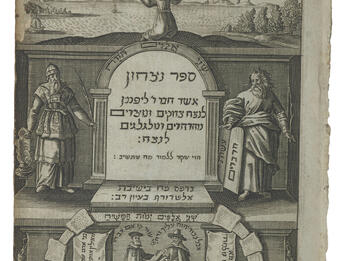Midrash Shemu’el (The Midrash of Samuel)
Furthermore, I say that another reason for this [commentary] is that since all of these ethical principles were given to Moses at Sinai and it is necessary to fulfill them, when one hears about them, he might feel that he is burdened with a heavy yoke. He may despair of heavenly mercy, thinking that he will not merit life in the world to come unless he fulfills all the words of the fathers [avot]. He can see with his own eyes that it is difficult for one to fulfill even a very few words of the fathers, and all the more so to fulfill all of them. He will therefore despair, saying that it is impossible for him to merit life in the world to come. Thus, this introductory clause was added, in order to teach people that all of Israel has a share in the world to come. Even if they do not fulfill all the words of the Fathers—as it is impossible for all of Israel to fulfill all of them—they will nevertheless have a portion in the world to come. The Tannaim [m. Sanhedrin 10:1] who taught that all of Israel has a portion in the world to come certainly did not disagree with the Tannaim who taught this tractate. The purpose of the teachings in this tractate is to make man upright, so that he will be pious, i.e., go beyond the letter of the law. For this reason, our rabbis of blessed memory were precise in their words [b. Bava Kamma 30a] by saying: he who wishes to be pious [should study tractate Avot]. And categorically, even those who do not fulfill all of them will have a portion in the world to come. [ . . . ]
The pious one [perhaps Joseph ben Shoshan] wrote that some maintain that there are three reasons why someone might sin. The first is his boasting over his fellow men and his derision of them; this will make him want to exploit them. The second is the increase of pleasures and the acquisition of illusory possessions. The third is the thought that in the netherworld where he is going, there will be no knowledge or accounting. This Tanna emphatically warned about this ethical principle, so that man should not sin at all. He said in relation to the first reason [m. Avot 3:1]: “Know from where you have come,” and do not boast. Regarding the second reason, it is stated [m. Avot 3:1]: “Know to where it is that you are going,” for all of your acquisitions will be of no use to you, and your pleasures will be null and void. In fact, they will actually be a burden to you, according to the saying of the Tanna [m. Avot 2:7]: “The greater one’s property, the greater are his worries.” In regard to the third reason, he said [m. Avot 3:1]: “Know before Whom you stand, etc.” The pious one wrote that in his opinion, this interpretation is correct, but that nevertheless it is important to listen to one of the great men of the generation who presented the following difficulty in regard to it: this reason is not enough for the nonboasting of man over his fellow man, since both of them are of one composition and were formed of the same matter. This is certainly a valid reason for man not to boast over the spheres or the angels. Furthermore, it seems that in remembering from where he has come, man will be drawn to transgression, for this offers a great justification for his sins. This is as King David argued: Behold, I was brought forth in iniquity, etc. (Psalms 51:7). Due to these difficulties, Rabbi M [perhaps Maimonides] offered a different interpretation and said that this Tanna emphasized his ethical principle in order to imprint it on our natures, so that we should not sin. This is because laughter and negligence accustom one to shameful acts [see m. Avot 3:13], for there is no greater cause of sin than distraction. Thus, the Tanna intended to bring sorrow to the hearts of people so that they would not be distracted and would not forget His doings. His basic idea is like the verses: your heart is lifted up, and you forgot [the Lord] (Deuteronomy 8:14); beware, lest you forget (Deuteronomy 4:9); and they forgot His doings (Psalms 78:11); and they soon forgot His works (Psalms 106:13). For this reason, it is written: “Know from where you have come,” and know the cause of your composition, and feel that you are ready for diseases, terrible tribulations, and accidents due to your composition. You do not know what each day will bring. Thus, do not be content with your status, as it is not permanent. Secondly, you should do as follows: your eyes shall drop tears, and you shall mourn for yourself, for you are dying and heading toward death. And thirdly, you should be ready to give an accounting. Thus, it is suitable for you to cover yourself with clothing of trembling and terror, and you should not sin, as it is said: Tremble, and sin not (Psalms 4:5). He mentioned these things because they subdue man’s nature and prevent him from thinking about acting upon transgressions.
Credits
Published in: The Posen Library of Jewish Culture and Civilization, vol. 5.



